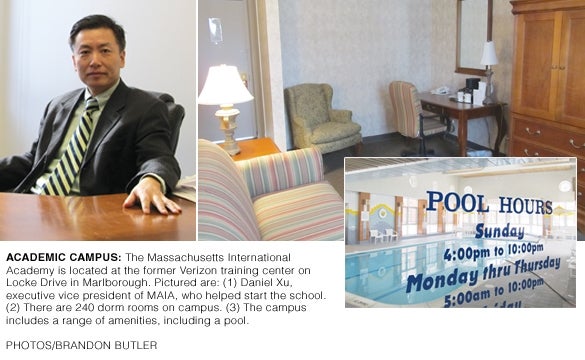Yuchen Yang, an 18-year-old who grew up outside of Beijing, China, decided while in an English-language international school in her homeland that she wanted to attend college in the United States.
“I really wanted to try another education system. I wanted to see another culture,” said Yang, whose first name translates to Belinda in English. Yang speaks fluent English but has a pronounced Chinese accent.
She applied for and received a student visa to attend the University of Mass-achusetts, which accepted her into the school.
The only problem was that her English skills were not quite up to a university level.
For students like Yang who fall just short in their English skills, there is a solution.
The Massachusetts International Academy (MAIA) in Marlborough is owned by a quasi-public Chinese organization and has been set up as a way for Chinese students to transition into the U.S. higher education system.
Since its opening in March 2009, the college preparatory and English-language learning program at MAIA has grown from about 40 students to 175. And the rapid growth doesn’t stop there. Officials plan to have about 250 students by next year.
And the school, which is located on 25 acres in Marlborough, is looking to upgrade its facility this spring. Officials with the academy are planning a roughly $200,000-expansion to add outdoor athletic and recreational areas to the academy.
And there are even grander plans for the future.
Building Connections
Nestled in the woods of Marlborough at the end of Locke Drive sits the New England Conference Center, as it was originally named. The 240,000-square-foot complex includes 240 dorm rooms, an auditorium, a swimming pool, exercise area and recreational rooms. It was previously owned by Verizon, which used the facility as a conference center until about 2007, according to Marlborough Building Commissioner Stephen Reid. The property sat vacant for two years before Cernet, the Beijing-based Chinese Education Research Network, purchased the building for $9.06 million in February 2009. Cernet owns Cermax, which is an American subsidiary that runs the academy.
About a month after the sale, MAIA opened its doors to 43 students, all of whom came directly from China. To attend MAIA they must have applied to and been accepted into UMass.
This spring, the academy will welcome about 175 students, all from China, who are at MAIA perfecting their English skills before beginning classes at UMass, mostly at the school’s Boston campus. A majority of the students stay in the program for about a year, depending on how much English-language training they need.
“It is such a global world now, so students in China want that international background,” said Daniel Xu, executive vice president of MAIA.
Xu said while there are a number of English language and transition programs for international students in the United States, MAIA is the only Chinese-specific program he knows of, at least in Massachusetts.
While MAIA’s main partnership is within UMass, once the students are in America they can transfer to other universities. So, for example, some students from the program have gone on to attend the University of Minnesota and Purdue University in Indiana.
The academy also has a partnership with Framingham State University, where commuter students from that school board at MAIA, but they don’t take any classes or participate in programs at the academy. Officials from the academy are in discussions with Quinsigamond Community College in Worcester to explore an affiliation as well.
Having a partnership with MAIA is beneficial for UMass in a number of ways, according to Stanley Wanucha, director of international and university preparation programs for UMass Boston.
First of all, increasing the school’s international diversity has been a goal for some time, he said. About 8 percent of the student body is now international students, he said.
In addition, having a partnership with MAIA helps the school attract out-of-state students, who pay more than in-state students to attend UMass.
But there are larger issues than just increasing diversity of the student body and the financial incentives.
“Having these international students on our campus allows them to interact with our domestic students,” Wanucha said. “They talk, they become friends, they interact. There’s really no better way to educate students with an international perspective than giving them these opportunities.”
Xu, the MAIA executive vice president, helped start MAIA two years ago after a career in the biomedical field. He grew up in Southwestern China and emigrated to the United States in 1991 to attend graduate school.
“The relationships these students are building will only make the channel between these two countries stronger,” Xu said.
In the short-term, officials are putting the finishing touches on plans to convert some of the complex’s more than 500 parking spaces into recreational facilities. That construction is expected to start in the spring.
Reid, the Marlborough building commissioner, said officials can move forward on the expansion with only an administrative review by town officials.
School officials have discussed building an indoor recreational facility in the coming years, worth upwards of a half million dollars, Xu said. There are even early discussions about opening up a second academy in Western Massachusetts.
For the Chinese students, the opportunity marks a chance of a lifetime, according to Yang, who studies at the academy. The Chinese education system, according to Yang and Xu, focuses on fundamentals of mostly science and mathematics. The U.S. higher education system, Xu said, allows for more creative and critical thinking.
Xu said allowing Chinese students to attend American universities gives them the best of both worlds.
After studying international affairs in America, Yang wants to move to her homeland and expand those creative educational opportunities in China.
“I want to change the world,” she said with a smile.

